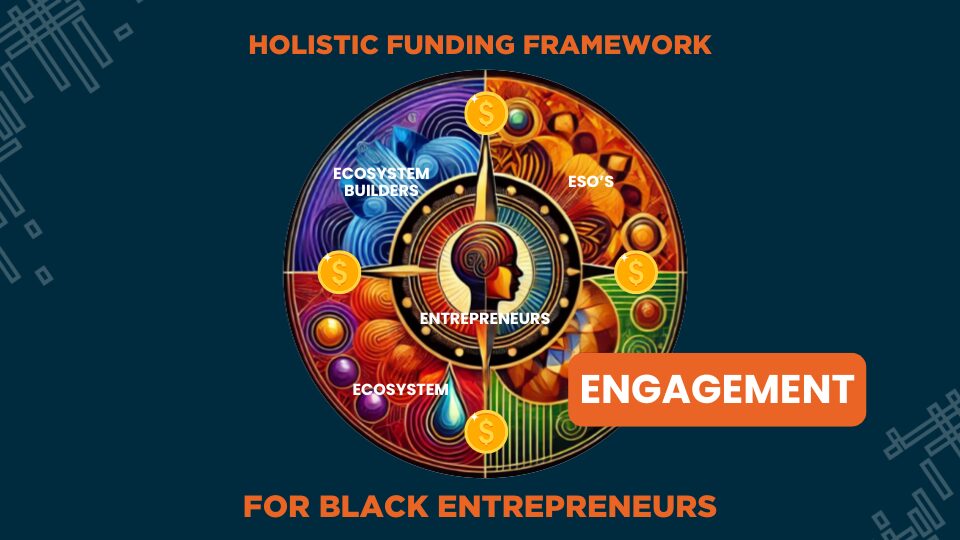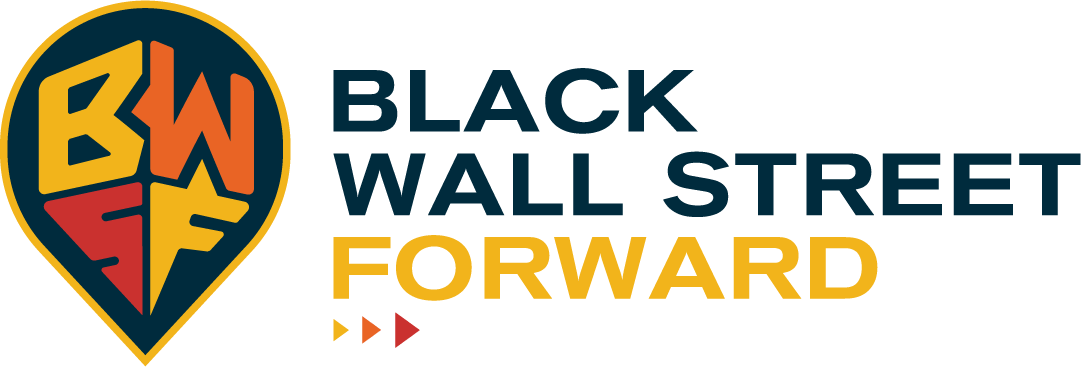This blog is part of The Funding Crisis for Black Entrepreneurs series.
In our first piece, we laid out a bold challenge to funders: if you want to create sustainable change for Black entrepreneurs, you must rethink how you invest. We introduced a new holistic funding framework that goes beyond transactional support and short-term grants—one that prioritizes the relationships, infrastructure, and direct capital needed to create lasting Black wealth.
Now, in Part 2 of this series, we’re diving deeper into the first and most foundational pillar of that framework: Engagement.
For Black entrepreneurs, business isn’t just about transactions—it’s about trust. Historically, Black Wall Streets thrived because they were built on deep, interwoven networks of relationships, shared economic power, and cooperative support. Yet today, mainstream funding models overlook this reality, failing to invest in the trust-based infrastructure that makes Black businesses grow.
Without intentional investment in deep relationship-building, funders will continue to see their dollars fall short. If trust isn’t present, capital won’t reach the businesses that need it, ecosystems won’t grow, and Black entrepreneurs will continue to operate within a system that wasn’t built for them.
Engagement must be the first and foundational investment in Black entrepreneur funding. It is the starting point for everything else—without trust, there is no access, no opportunity, and no sustainable growth. In this piece, we’ll examine the role of trust in Black business success, the historical and systemic forces that have eroded it, and the steps funders must take to rebuild and prioritize engagement as a core investment strategy.
If we truly want to see Black businesses thrive at scale, we have to stop treating relationships as an afterthought and start funding the work of engagement. Let’s dive in.

Why Deep Relationship-Building is Non-Negotiable for Black Entrepreneurs
1. Cultural Norms Shape How Black Entrepreneurs Do Business
Black entrepreneurs don’t just build businesses—they build community. Historically, Black business districts thrived not only because of economic activity but because of deep, interconnected networks of trust, loyalty, and shared resilience.
Unlike mainstream business environments that often prioritize individual transactions, Black entrepreneurs depend on trusted relationships—word-of-mouth referrals, community credibility, and cooperative economics. Funders who fail to recognize this are missing the key to how Black businesses actually grow.
2. The Reality of Diminished Trust and Why It Matters
Decades of systemic disinvestment, predatory lending, and empty diversity pledges have created a justifiable trust gap between Black communities and traditional funders. Many Black entrepreneurs and Black-led organizations have seen:
- One-time grants with no follow-up support
- Extractive partnerships where mainstream institutions benefit from Black expertise but fail to reinvest
- Funding models that demand proof of success before providing resources
This isn’t skepticism—it’s experience. When funders show up only when it’s politically convenient, or when Black entrepreneurs are expected to "prove" their worthiness over and over again (unlike other startup counterparts) trust is eroded. Without trust, capital doesn’t flow, partnerships don’t last, and ecosystems can’t scale.
What Engagement Funding Can Look Like in Practice
 Investing in engagement means funding the trust-building infrastructure that makes capital, resources, and opportunities more accessible to Black entrepreneurs. While often overlooked by traditional funders, engagement can take many forms—each critical to fostering a thriving, interconnected Black entrepreneurial ecosystem.
Investing in engagement means funding the trust-building infrastructure that makes capital, resources, and opportunities more accessible to Black entrepreneurs. While often overlooked by traditional funders, engagement can take many forms—each critical to fostering a thriving, interconnected Black entrepreneurial ecosystem.
Here are some real-world examples of how engagement funding is being used effectively today:
- Funding Peer-Led Entrepreneur Networks – One philanthropic funder has committed multi-year, unrestricted funding to a Black-led organization that facilitates local, peer-based entrepreneurial cohorts. These cohorts allow Black entrepreneurs to share knowledge, access mentorship, and collectively advocate for policies that serve their needs. The funding supports community-building spaces, coaching stipends, and the operational infrastructure needed to sustain these critical peer networks.
- Investing in Black-Led Mentor Programs – Recognizing that many mainstream mentorship programs fail to account for the unique challenges Black entrepreneurs face, a group of funders is supporting Black-led mentorship initiatives that pair emerging entrepreneurs with experienced Black business owners and ecosystem leaders. These programs focus on culturally relevant coaching, trust-based relationships, and real-world business connections that help Black founders navigate barriers and access growth opportunities.
- Providing Multi-Year General Operating Support for Black-Led Business Associations – A group of funders has recognized that Black business associations often serve as a critical hub for engagement and advocacy. Rather than funding only one-off initiatives, they are providing unrestricted, multi-year funding for these organizations to build long-term capacity, engage in policy advocacy, and facilitate networking and trust-building activities for Black business owners.
- Backing Place-Based Convening & Relationship-Building Initiatives – Some funders are stepping up to support in-person convenings, local Black business festivals, and co-working hubs that prioritize trust-building. These investments create safe and dynamic spaces where entrepreneurs can form relationships, share insights, and forge partnerships that lead to tangible business opportunities.
These are just a few ways funders can intentionally invest in engagement—by prioritizing trust, relationships, and the social infrastructure that allows Black entrepreneurs to thrive. When engagement is funded, ecosystems become stronger, businesses become more resilient, and economic opportunities expand.
Why Some Funders May Overlook Engagement—And Why That Must Change

One of the biggest blind spots in traditional philanthropy and investment is the belief that if you fund the programs, the relationships will follow. That’s simply not true.
Funders often prioritize measurable outcomes over the invisible but essential work of trust-building. Because relationships are harder to quantify than revenue growth or business creation, funders often deprioritize or ignore them altogether.
But here’s the truth: When trust exists, everything else flows more easily.
- More entrepreneurs access capital
- More Black businesses scale and sustain themselves
- More funders achieve long-term impact
This is why relationship-building isn’t an afterthought—it’s the first, foundational investment funders should be making.
What’s Next: A Call to Funders
If you’re funding Black entrepreneurs but haven’t yet prioritized investment in engagement, ask yourself:
- Are the organizations you fund deeply trusted by the communities they serve?
- Are you funding long-term relationship-building, or just short-term initiatives?
- Are Black entrepreneurs telling you what they need, or are you deciding for them?
If you can’t answer these confidently, it’s time to rethink your investment strategy.
Engagement is not just another funding category—it’s the glue that holds everything together. Without trust, capital doesn’t flow where it’s needed. Without relationships, ecosystems don’t grow. Without deep engagement, Black businesses remain underfunded and undervalued.
The work that Forward Cities has done with ecosystems across the country has given us deep insights into this unique need for Black-centric ecosystems. We invite funders, investors, and ecosystem builders to connect with us. Let’s explore ways to fund engagement intentionally and effectively.
Interested in learning more? Let’s talk. Reach out to explore how we can build trust-driven, high-impact investments together.
UP NEXT:
 ABOUT THE AUTHOR
ABOUT THE AUTHOR
Fay Horwitt
Chief Program Officer, Forward Cities
Fay serves as the Chief Program Officer of Forward Cities, where she oversees organizational strategy. In addition, Fay is a dedicated advocate for the emerging profession of ecosystem building, and as a founding member of Ecosystems Unite. Beyond her formal roles, she is a sought after presenter, trainer, and thought leader on the topic of equitable entrepreneurial ecosystem building. Never one to be content with status quo, Fay has also recently begun addressing a new need in local communities: ecosystem healing–helping pivot ecosystems and institutions in this time of the dual COVID-19 and systemic racial injustice pandemics.

The Black Wall Street Forward initiative aims to reshape narratives, engage community leaders and entrepreneurs, and foster sustainable, equitably invested, Black-centric entrepreneurial communities.
Are you interested in learning more about Black Wall Street Forward or finding ways to join the movement? Subscribe to the newsletter to stay updated on what’s new and ways to engage with us.